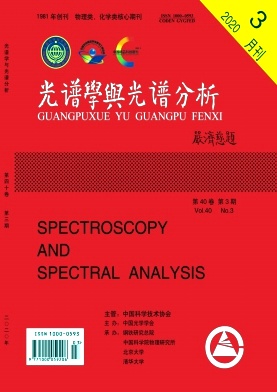光谱学与光谱分析, 2020, 40 (3): 867, 网络出版: 2020-03-25
湿度对水泥生料近红外光谱检测的影响及补偿方法
Effect of Humidity on Determination of Main Components in Cement Raw Meal Using Near Infrared Spectroscopy and Compensation Method
摘要
近红外光谱检测已被应用于水泥生料成分的快速检测, 但现场环境中的湿度等因素会对光谱产生干扰, 从而降低检测精度。 为了提高检测精度, 在实验分析湿度对水泥生料近红外光谱检测影响的基础上研究了补偿方法。 在水泥厂选取了24份水泥生料样本, 其中18份作为校正集, 6份作为验证集; 水泥生料中的有效成分为SiO2, Al2O3, Fe2O3和CaCO3, 各成分含量的标准值由X射线荧光光谱分析测出。 首先, 将校正集的18份样本每份重复装样测5次光谱, 用得到的90个光谱建立模型Ⅰ; 再每份样品制作5个湿度梯度样本, 其获得过程为, 先将样本放置在电加热平台上, 用玻璃棒将样本摊平, 180 ℃下加热30 min, 再将样本放置在散热片上进行降温, 待样品恢复室温后取出进行第一次光谱扫描, 得到1个光谱, 将测量后的样本放入搅拌器, 使用装有去离子水的喷雾器对其喷雾两次, 然后搅拌30 s混合均匀, 测量混合后的样本得到下一个光谱, 重复该过程, 得到具有湿度梯度的5个光谱。 所有样本均采用烘干法进行湿度测量, 样本湿度变化区间在0.6%~2%以内。 对每个湿度梯度的样本测量1次, 用得到的这90个光谱建立模型Ⅱ。 然后, 将验证集的6份样本每份制作5个湿度梯度, 获取方式与校正集相同, 对每个湿度梯度的样本测量1次, 得到30个光谱。 所有光谱均采用多元散射校正预处理, 拟合波段选择4 000~5 000 cm-1, 建模方法采用偏最小二乘法。 比较同一份样本的5个湿度梯度, 可以看到在5 200 cm-1处光谱差异最大, 在其他位置也有肉眼可见的明显差异, 因此, 湿度变化对全波段光谱有明显的影响。 最后, 将这30个光谱输入模型Ⅰ与模型Ⅱ进行验证, 并对比模型Ⅰ与模型Ⅱ的预测均方根误差RMSEP。 模型Ⅱ中SiO2, Al2O3, Fe2O3和CaCO3的预测均方根误差RMSEP比模型Ⅰ分别减小了25%, 31.3%, 33.3%和25%。 实验结果表明, 水泥生料样本湿度对近红外光谱模型的预测结果具有一定的影响, 采用具有湿度梯度的样本进行建模可有效降低湿度对预测结果的影响。
Abstract
As a new detection method, near infrared spectroscopy (NIR) has been applied to the rapid compositional analysis of cement raw meal. However, environmental factors such as humidity may have a potential impact on its detection. In order to improve the accuracy of the detection, we studied compensation method based on the impact of humidity upon near infrared spectroscopy of cement raw meal. Twenty four cement raw meal samples were obtained from cement factories. Eighteen of them were used as the calibration set; six of them were used as the validation set. The effective ingredients in cement raw meal were SiO2, Al2O3, Fe2O3, and CaCO3. The standard value of the contents of each ingredient was measured by X-ray fluorescence analysis. Firstly, eighteen samples of calibration set were repeatly measured five times, and ninety spectra were obtained, which were used to establish model Ⅰ. Then five humidity gradients were made for eighteen samples of calibration set. The process to generate the humidity gradient sample was as follows: first, the samples were placed on an electric heating platform, flattened with glass rod and heated at 180 ℃ for 30 minutes, then the samples were placed on the radiation fin to cool. When the sample restored to room temperature, they were taken out and a spectrum was obtained. The samples were placed in the agitator, sprayed with deionized water for two times, and then stirred for 30 seconds to be mixed evenly. After that, the mixed sample was measured to get the next spectrum. Five spectra with certain humidity gradients were obtained by repeating the process. The humidity of all samples was measured by drying method. The range of humidity change was within 0.6%~2%. Each sample with certain humidity was measured once, and these ninety spectra were used to establish the model Ⅱ. Then, five humidity gradients were made for the validation set in the same way as the calibration set. Thirty spectra were obtained by detecting each humidity gradient sample in the validation set. All spectra were pre-processed by multivariate scattering correction, and the fitting band was 4 000~5 000 cm-1. Partial least squares method was used for modeling. Comparing the five humidity gradients of the same sample, we could see that the spectra have the greatest differences at 5 200 cm-1, and there were also obvious differences at other locations, so the humidity change has a significant impact on the whole spectrum. Finally, the root mean square error of prediction (RMSEP) of the 30 spectra in model Ⅰ and model Ⅱ were compared. The RMSEP of SiO2, AlO3, Fe2O3 and CaCO3 in model Ⅱ was reduced by 25%, 31.3%, 33.3% and 25% compared with model Ⅰ. The experimental results show that the humidity of cement raw meal sample has a certain influence on the prediction results of near infrared spectroscopy model. Modeling with humidity gradient samples can effectively reduce the influence of humidity on the prediction results.
肖航, 杨振发, 张雷, 张法业, 隋青美, 贾磊, 姜明顺. 湿度对水泥生料近红外光谱检测的影响及补偿方法[J]. 光谱学与光谱分析, 2020, 40(3): 867. XIAO Hang, YANG Zhen-fa, ZHANG Lei, ZHANG Fa-ye, SUI Qing-mei, JIA Lei, JIANG Ming-shun. Effect of Humidity on Determination of Main Components in Cement Raw Meal Using Near Infrared Spectroscopy and Compensation Method[J]. Spectroscopy and Spectral Analysis, 2020, 40(3): 867.



